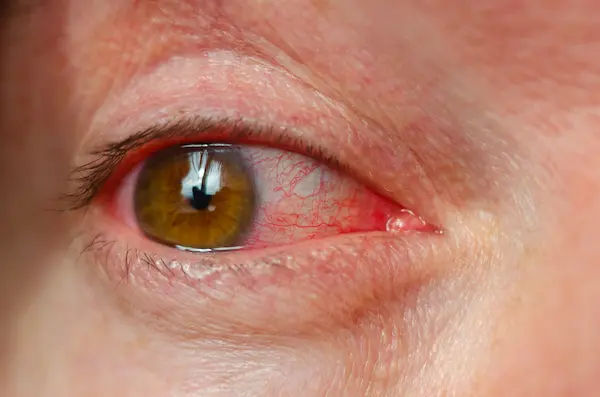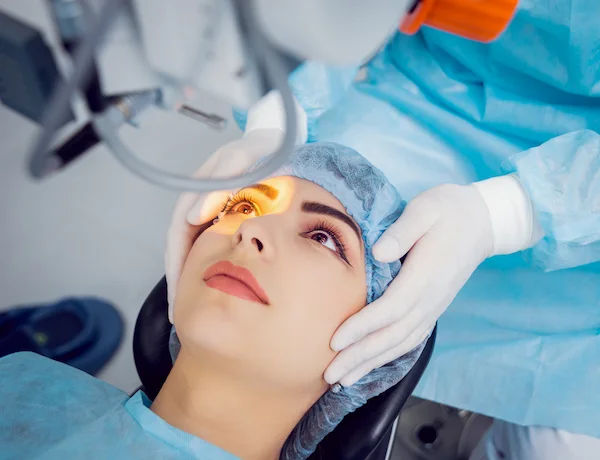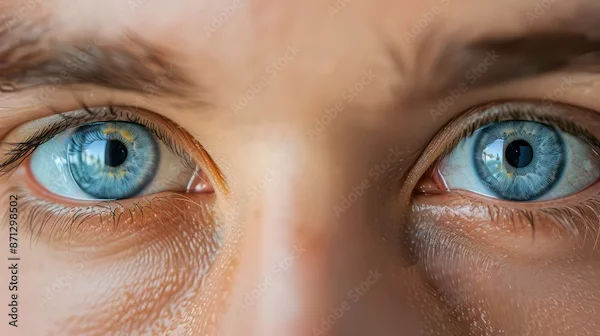Is Scar Tissue Normal After Cataract Surgery
Concerned about scar tissue after cataract surgery? Discover if it's normal, what causes it, and how treatments like YAG laser can restore clear vision.

Written by Dr. Dhankecha Mayank Dineshbhai
Reviewed by Dr. D Bhanu Prakash MBBS, AFIH, Advanced certificate in critical care medicine, Fellowship in critical care medicine
Last updated on 24th Sep, 2025

Introduction
Cataract surgery is a common and generally safe procedure that helps restore clear vision by replacing the cloudy lens in your eye with an artificial one. While the surgery has a high success rate, some patients may notice changes in their vision afterward, including the development of scar tissue. If you're wondering whether scar tissue after cataract surgery is normal, this article will help you understand what to expect and how to manage it.
Understanding Scar Tissue After Cataract Surgery
Scar tissue, also known as posterior capsule opacification (PCO), is a common occurrence after cataract surgery. It happens when cells left behind after the procedure grow on the thin membrane (called the posterior capsule) that holds your new artificial lens in place. Over time, these cells can multiply and form a cloudy layer, which may cause blurred or hazy vision—similar to the original cataract symptoms.
Is Scar Tissue Normal?
Yes, scar tissue formation is a normal part of the healing process for some patients. Studies suggest that up to 2050% of people may develop some degree of PCO within a few months to years after cataract surgery. However, not everyone experiences vision problems because of it.
Symptoms of Scar Tissue Formation
If scar tissue develops, you may notice:
Blurry or hazy vision
Glare or halos around lights (especially at night)
Difficulty reading or seeing fine details
A gradual decline in vision clarity
These symptoms can be similar to those of cataracts, which is why some people mistakenly think their cataract has returned. However, PCO is not a regrowth of the cataract but rather a separate issue that can be easily treated.
Causes of Scar Tissue After Cataract Surgery
The main cause of PCO is the natural healing response of the eye. During cataract surgery, the surgeon removes the cloudy lens but leaves the posterior capsule intact to support the new artificial lens. Sometimes, leftover lens epithelial cells can grow and spread across this capsule, leading to scar tissue formation.
Consult Top Specialists for Cataract Surgery & PCO Treatment
Risk Factors for Developing PCO
Some factors may increase the likelihood of developing scar tissue, including:
Younger age (younger patients have more active cell growth)
Certain medical conditions (like diabetes)
Type of intraocular lens (IOL) used (some lenses are designed to reduce PCO risk)
Inflammation or slow healing after surgery
How Scar Tissue Affects Your Vision?
PCO is not harmful to your eye health, but it can affect your vision quality. The cloudiness caused by scar tissue scatters light entering the eye, making images appear less sharp. Fortunately, this condition is easily treatable with a quick and painless laser procedure called YAG laser capsulotomy.
Treatment for Scar Tissue (YAG Laser Capsulotomy)
If scar tissue is affecting your vision, your eye doctor may recommend a YAG laser capsulotomy. This is a simple, noninvasive procedure that takes only a few minutes and is performed in the clinic. Here’s what to expect:
Preparation: Your eye will be numbed with drops, and you may be given a mild dilating drop.
The Procedure: The doctor uses a laser to create a small opening in the cloudy capsule, allowing light to pass through clearly again.
Recovery: Vision improvement is usually immediate, and you can resume normal activities the same day.
Is YAG Laser Capsulotomy Safe?
Yes, it is a very safe procedure with minimal risks. Some patients may experience floaters (tiny specks in vision) afterward, but these usually fade over time. Serious complications are rare.
Tips to Reduce the Risk of Scar Tissue
While PCO cannot always be prevented, these steps may help lower the chances:
Follow postsurgery care instructions (use prescribed eye drops to reduce inflammation).
Attend all followup visits so your doctor can monitor healing.
Choose an advanced IOL (some lenses are designed to minimize PCO risk).
Manage underlying health conditions (like diabetes) that may affect healing.
When to See a Doctor?
If you experience any of the following after cataract surgery, consult your eye specialist:
Sudden vision changes
Increased floaters or flashes of light
Severe eye pain or redness
Persistent blurry vision despite using prescribed drops
These could indicate other complications that need prompt attention.
Final Thoughts
Scar tissue after cataract surgery is a normal and treatable condition. While it may cause temporary vision changes, a quick laser procedure can restore clarity. If you notice any vision problems after surgery, don’t hesitate to reach out to your eye doctor for an evaluation.
Need Help? Book a Consultation Today!
If you're experiencing vision changes after cataract surgery or have concerns about scar tissue, Apollo 24|7 offers expert consultations with experienced ophthalmologists. Schedule an appointment today to get the care you need.
Consult Top Specialists for Cataract Surgery & PCO Treatment
Consult Top Specialists for Cataract Surgery & PCO Treatment
Dr. Padmini S
Ophthalmologist
4 Years • MBBS,MS
Bengaluru
Apollo Medical Center, Marathahalli, Bengaluru

Dr. Zennat Tajmin Shah
Ophthalmologist
24 Years • MBBS,DNB (ophthalmology)
Kolkata
Titanium Eye Care, Kolkata

Dr Ranojit Basu
Ophthalmologist
24 Years • MBBS, DNB Ophthalmology, Diploma in Ophthalmic Medicine and. Surgery
Kolkata
Titanium Eye Care, Kolkata

Dr. Atheeshwar Das
Ophthalmologist
15 Years • MBBS,DO,DNB(Gold Medal),FRCS(Glasgow),FICO(UK),
Chennai
Apollo Speciality Hospitals OMR, Chennai

Dr. Sunanda Nandi
Ophthalmologist
7 Years • MBBS, MS (Ophthalmology)
Silchar
Apollo Clinic Silchar, Silchar
Consult Top Specialists for Cataract Surgery & PCO Treatment
Dr. Padmini S
Ophthalmologist
4 Years • MBBS,MS
Bengaluru
Apollo Medical Center, Marathahalli, Bengaluru

Dr. Zennat Tajmin Shah
Ophthalmologist
24 Years • MBBS,DNB (ophthalmology)
Kolkata
Titanium Eye Care, Kolkata

Dr Ranojit Basu
Ophthalmologist
24 Years • MBBS, DNB Ophthalmology, Diploma in Ophthalmic Medicine and. Surgery
Kolkata
Titanium Eye Care, Kolkata

Dr. Atheeshwar Das
Ophthalmologist
15 Years • MBBS,DO,DNB(Gold Medal),FRCS(Glasgow),FICO(UK),
Chennai
Apollo Speciality Hospitals OMR, Chennai

Dr. Sunanda Nandi
Ophthalmologist
7 Years • MBBS, MS (Ophthalmology)
Silchar
Apollo Clinic Silchar, Silchar




